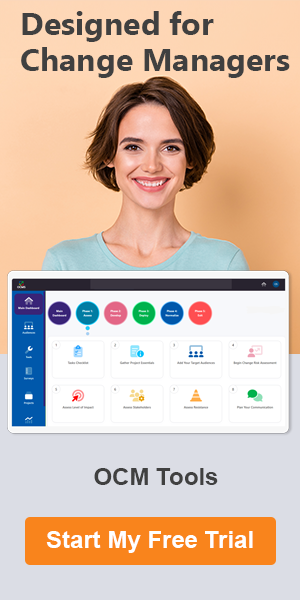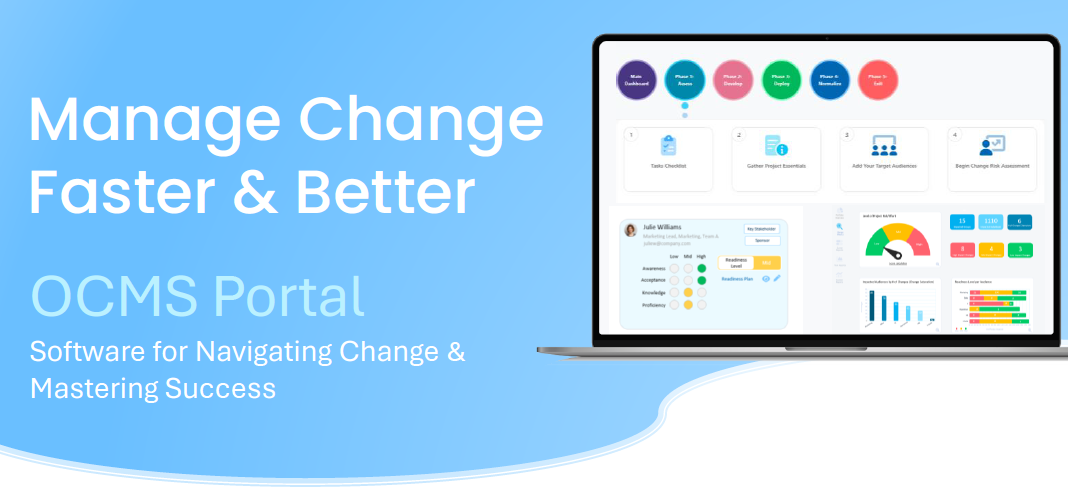How to Determine if Your Project Needs a Change Agents Network
Picture this: you’re spearheading a major initiative, perhaps a digital transformation or a cultural shift within your organization. Amidst the chaos and complexity, the idea of a Change Agents Network emerges as a beacon of hope, promising to amplify your efforts and drive sustainable change from within.
But before you dive headfirst into assembling your army of change champions, it’s crucial to pause and ponder: is a network of change agents the silver bullet your project needs, or just another layer of complexity?

Join us as we delve into the world of change agents (also known as change champions), exploring their superpowers, their role in project success, and how to determine if your project needs one.
Watch a summary below:
Story Highlights
|
Who Are Change Agents? (Change Agent Defined)
Change agents are individuals within an organization who champion change initiatives. They act as bridges between leadership and employees, promoting understanding, addressing concerns, and fostering a culture of adoption. They are passionate about the change initiative and actively work to influence the behavior of their peers.
The agent of change meaning can be used to describe a wide range of supporters – from sponsors to supportive managers. However, in the context of this article, a change agent is part of a formal network of individuals who have been invited to support the project in a specific way. They’re part of a Change Agent or Change Champions Network.
Do you have any questions about this section on change agent defined, answering what a change agent is? Please reach out and let us know.
What is a Change Agents Network?
A Change Agents Network is a formal group of individuals strategically selected to support the implementation of a change initiative. This network acts as an extension of the change management team, amplifying their efforts and reaching a wider audience within the organization.
Change agent leadership is intentional to help employees in the organization better understand and adopt organizational changes. Engagement from an agent of change examples include sending targeted communication to their departments, asking for feedback on the project, and watching for roadblocks and resistance among their peers.
What Are the Benefits of a Change Agents Network?
Building a strong Change Agents Network offers several benefits to your change management initiative.
Enhanced Communication and Reach
Being a change agent in an organization means serving as a communication channel, disseminating information and updates to colleagues in a relatable and familiar way. This broadens the reach of the OCM team’s communication beyond official channels and fosters trust among employees.
Increased Employee Engagement
An agent of change actively engages with colleagues, addressing concerns, answering questions, and generating excitement about the change. This personal outreach fosters a sense of ownership and encourages participation in the change process.
Identification of Potential Challenges
Change management agents are embedded within their teams and departments. They can detect potential roadblocks, identify concerns early on, and provide valuable insights to the change management team.
Role Modeling and Leading by Example
Change agents model the desired behaviors associated with the change. Their positive attitude and enthusiasm encourage others to embrace the change and participate actively.
Improved Training Effectiveness
Being a change agent in an organization means serving as a peer coach and mentor, providing additional support and clarification to colleagues following formal training sessions.
Please let us know if you have any feedback or questions about agent of change examples or being a change agent. We’ll be happy to help!
Does Your Project Need a Change Agents Network?
As helpful as a change agent is, not every change initiative requires a dedicated network of change agents. There are some agent of change examples, where a network may have more drawbacks than benefits.
Here are some factors to consider when making this decision:
1. Scope and Scale of the Change:
- Large-scale, organization-wide initiatives with significant impact on multiple departments and teams benefit greatly from a Change Champions or Change Agents Network. This broader outreach ensures everyone receives crucial information and fosters a cohesive approach to change.
- Smaller, departmental changes might not necessitate a formal network. Communication within smaller teams might be more direct, allowing leaders to effectively disseminate information and address concerns.
2. Complexity of the Change:
- Complex initiatives with significant changes to workflows, processes, or technologies benefit from the targeted support of change agents in an organization. They can provide in-depth explanations, address specific concerns related to individual roles, and navigate potential challenges during implementation.
- Simpler changes with minimal disruption to day-to-day operations might not require dedicated change agent leadership. Direct communication and readily available resources might be sufficient for successful adoption.
3. Organizational Culture and Communication:
- Organizations with a strong culture of communication and transparency might not require a formal Change Agents Network. Open communication channels and a supportive management style might create an environment where information flows freely and employees feel comfortable voicing questions.
- Organizations with hierarchical structures or limited communication channels would benefit from a network of change agents. They can help bridge the gap between leadership and employees, ensuring crucial information reaches all levels of the organization.
4. Availability of Resources:
One last consideration when deciding on a change management agent network is the resources you have available. Building and managing an agent of change network requires time and resources. Before implementing a network, consider the workload on the change management team and whether resources are sufficient to support and guide change agents effectively.
Save time by leveraging free Change Agents Network resources.
Building a Strong Change Agents Network
If you decide that a Change Agents Network will be beneficial for the project you’re supporting, here are some key steps to get you started.
Identify Potential Change Agents
Look for individuals who are respected within their teams, enthusiastic about the change, and possess strong communication and interpersonal skills.
Define Roles and Responsibilities
Outline the expectations for change agents regarding communication, support, and participation in network activities.
Provide Training and Ongoing Support
Equip change agents with the knowledge and resources they need to be effective. This could include training on the specific change initiative, communication skills development workshops, and access to resources like FAQs and Q&A sessions.
Foster Collaboration and Recognition
Create opportunities for the individuals in your Change Agents Network to share best practices, collaborate on challenges, and celebrate successes. Public recognition for their contributions motivates them and demonstrates the value they bring to the change process.
Measure and Adapt
Regularly assess the effectiveness of your Change Agents Network. Gather feedback from change agents and colleagues to identify areas for improvement and adapt your approach as needed.
Would you like more OCM tips and information including change agent defined answers, agent of change meaning, or agent of change examples? Sign up for our newsletter.
Conclusion: Change Agents – A Spark That Ignites Change
A Change Champions or Change Agents Network can be a powerful force for positive change within your organization. By carefully considering your project needs and strategically building a change agent leadership network, you can amplify your communication efforts, foster employee engagement, and ultimately increase your chance of successful change adoption.
Remember, change agents are the spark that ignites a fire of enthusiasm and motivation within your organization. Invest in their development, empower them to be ambassadors of change, and watch your change management initiatives transform from good intentions to successful outcomes.
Easily Assess & Manage Change & Change Agents
Is there one tool that enables you to manage your Change Agents Network and conduct all other change management activities? Yes! It’s called OCMS Portal!
This all-in-one change management platform automated change management deliverables, including providing surveys and automated change agent engagement plans.
FAQ: Agent of Change Meaning
What is a change agent or an agent of change?
A change agent is an individual within an organization who champions change initiatives. They act as bridges between leadership and employees, promoting understanding, addressing concerns, and fostering a culture of adoption.
What is a Change Agents Network?
A Change Agents Network is a formal group of individuals strategically selected to support the implementation of a change initiative. This network amplifies the efforts of the change management team.
How do I know if my project needs a change management agent network?
Once you understand the agent of change meaning and benefits, it’s important to know how to decide if one is right for a change initiative. Some decision factors include the scope and scale of the change, the complexity of the initiative, the culture of the organization, and the availability of resources.
Note: Content on OCM Solution's ocmsolution.com website is protected by copyright. Should you have any questions or comments regarding this OCM Solutions page, please reach out to Ogbe Airiodion (Change Management Lead) or the OCM Solutions Team today. OCM Solution was previously known as Airiodion Global Services (AGS).
External Sources: stock.adobe.com




